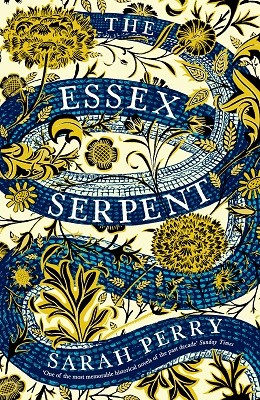Xenodike reviewed The Essex Serpent by Sarah Perry
Review of 'The Essex Serpent' on 'Goodreads'
3 stars
Once in a while, I'll choose a book without really paying any attention to book blurbs. In the case of The Essex Serpent, it was one of those books I'd noticed in passing on lists over Best Books of 2017. I'd been drawn to the cover in books stores, and at one point I think I must have read the blurb even though when I, on a whim, decided to read it I couldn't remember much about it.
The Essex Serpent begins in London in the late nineteenth century, where Cora Seaborne has just become a widow. Through the early chapters, it's quickly made clear, although more in tone and atmosphere than in graphic descriptions that from Cora's perspective, this has been a particularly unpleasant marriage.
Encircling Cora are a few central characters, her son Francis, who today would probably be diagnosed on the autism spectra. Martha, the governess, and Cora's companion as well as a few others important to the overall story.
The second central character is William Ransom, a priest, and a family man living in the Essex town of Aldwinter. These two characters lives intertwine, when Cora, a keen naturalist and fascinated with fossils and science, decided to leave London and travel to Essex for an extended visit.
What initially connects these characters, is a larger plot surrounding mysterious deaths and disappearances in Essex. The locals believe that these occurrences are linked to a mythological creature known as the Essex Serpent. This leads to interesting clashes of old versus new, and superstition against reason.
From my point-of-view, this is by far the best part of the novel. The sections of the book dealing with the mystery of the Essex Serpent, the escalating fear in the area and Cora and Wiliams intellectual clashes regarding theology, science and the possibility of the unknown is by far the most atmospheric and exciting.
That atmosphere is made even more impactful by the fact that The Essex Serpent is a beautifully written book. If you enjoy the kind of languages, she uses. It's worth noting that it might be too much for some people, the prose is very heavy, and some might find it pretentious. If you're unsure I'd recommend you read an excerpt to get a feel for the author's use of language; I find it stunning, at certain points, it's so poignant it takes your breath away.
Unfortunately, its effect is dampened by an unnecessary love story.
This might be the time for a disclaimer of sorts. I don't generally read romance novels; I don't mind romance in novels, but I prefer them not to be the focus of the story. I say this, because if you are a fan of stories about impossible love, or the popular trope, "opposites attract with complications" then the romance part of this novel might be just your thing.
For me, this book is a perfect example of when romance interferes with what could be a fantastic novel. The relationship that develops between Cora and William would, in my opinion, have been so much more interesting if the author kept it platonic and intellectual.
Instead, it becomes one of those books where, not only William but pretty much everyone is completely enamored with Cora; as a reader, I don't understand why. She becomes one of those "unconventional" heroines; she's unconventionally beautiful, unconventionally intellectual for the time, has an unconventional fashion sense (but she's still stylish), and she's unconventionally independent. She's unconventional to the point that, to me, she becomes unbelievable.
I get the impression that the internal journey for Cora is supposed to be the development of a person numb from years of living under constant control, critic and terror to a person able to live her own life and build meaningful relationships with people; I don't see that development.
The book chronicle a relatively short period and during that, she goes from controlled and constantly terrified to a confident, independent person who, apart from doubting her ability to connect with people, shows no apparent signs of having lived in an abusive relationship.
This is a shame because Cora could be a fascinating character. The parts of the book when she's involved in scientific activities, when she's allowed to discuss her interests or investigating the Essex Serpent, shows a great character. But when the romance enters the story about half-way though the book, she becomes slightly cliche; the abused woman who's yet to known love brought to life through the attention of a good man. Sigh.
As for William, I think his character is done a real disservice by the romance. When we met him, he is genuinely in love with his wife and devoted to his children. In order to make room for a budding romance between William and Cora, minor issues like a wife and family need to be dealt with. It's all a little too convenient.
It's such a shame because both characters are well-written, and had their relationship and interactions been kept platonic it would have been delightful and interesting watching their story unfold. The books major problem, a direct result of the romance, is that it manages the feat of making its main characters go from likable to unlikable.
However, you might feel completely different. Scrolling though reviews on Goodreads shows that many people truly enjoyed the love story; it's all comes down to your personal preference.
My second issue with The Essex Serpent is worldbuilding. Coming into this story, I had a vague recollection that it was a historical novel. As the book progressed, I managed to pinpoint the time though clues in the text, things like the description of science, political issues, clothes, and other things led me to understand that the story took place in the late nineteenth century. However, I was able to do this is because I'm interested in history. In fact, I had only just finished a university course studying nineteenth-century European history.
My point is, if you approach this book without knowing that it takes place in this particular period, the book doesn't really help you understand the world it's dropped you into. It takes for granted that you have at least a basic understanding of late nineteenth-century England, its political climate, social structures and so on; if you don't, the worldbuilding can feel vague, and you're left to fill in a lot of blanks on your own.
Final Thoughts
The Essex Serpent is one of those books that leave me conflicted. Conflicted because I want to like it. I wish half of the plot had been thrown out the window and that the author had focused on her fascinating tale sounding the Essex Serpent and the effect it had on the characters. Unfortunately, instead of that poignant, atmospheric tale, it becomes a love story that makes her characters unsympathetic and the heroine unbelievable.
There's no doubt that this is a beautiful book, it's stunningly written.
Unfortunately, the love story behind the beautiful words is pretty average, and it overshadows the part of the plot that isn't. Of course, a person less crass and more of a romantic than me might vehemently disagree.
Reservations aside, I didn't dislike the book. I don't regret reading it. I think many people would and have enjoyed it a lot more than I did. It's more a case of wishing it could have lived up to its potential.
Overall, if you like historical novels and impossible romance, you'll probably love this book. If you don't, it might be worth a read to experience the way the story is told.
For me, the book left me longing for the story this could have been.

